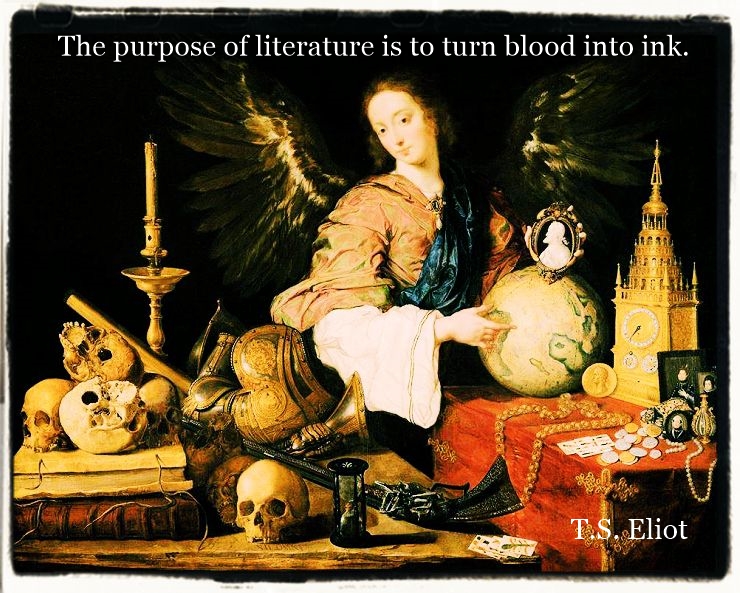
I realized early on that the academy and the literary world alike – and I don’t think there really is a distinction between the two – are always dominated by fools, knaves, charlatans and bureaucrats. And that being the case, any human being, male or female, of whatever status, who has a voice of her or his own, is not going to be liked.
Harold Bloom
Yet if the only form of tradition, of handing down, consisted in following the ways of the immediate generation before us in a blind or timid adherence to its successes, “tradition” should positively be discouraged. We have seen many such simple currents soon lost in the sand; and novelty is better than repetition. Tradition is a matter of much wider significance. It cannot be inherited, and if you want it you must obtain it by great labour…the historical sense involves a perception, not only of the pastness of the past, but of its presence; the historical sense compels a man to write not merely with his own generation in his bones, but with a feeling that the whole of the literature of Europe from Homer and within it the whole of the literature of his own country has a simultaneous existence and composes a simultaneous order. This historical sense, which is a sense of the timeless as well as of the temporal and of the timeless and of the temporal together, is what makes a writer traditional. And it is at the same time what makes a writer most acutely conscious of his place in time, of his contemporaneity.
T.S. Eliot, Tradition and the Individual Talent: An Essay
Literature is a vague term which usually denotes works which belong to the major genres: epic, drama, lyric, ode, novel, short story, etc. In any case its main feature is that it is referred to the practice and profession of writing and reading. It comes from human interest in telling a story, in arranging words in artistic forms, in describing in words some aspects of human experiences. So we can read Literature for Knowledge, for Pleasure, for Relaxation or as a therapy to the nuisances of life! Literature, painting, sculpture, theatre, film – all these forms are part of people’s efforts to transcend reality. It might be for the purpose of moralizing, of presenting a “higher truth,” or simply to entertain, to replace the theatre of the real with pleasant fantasy.
Carl William Brown
Most definitions of literature have been criterial definitions, definitions based on a list of criteria which all literary works must meet. However, more current theories of meaning take the view that definitions are based on prototypes: there is broad agreement about good examples that meet all of the prototypical characteristics, and other examples are related to the prototypes by family resemblance. For literary works, prototypical characteristics include careful use of language, being written in a literary genre (poetry, prose fiction, or drama), being read aesthetically, and containing many weak implicatures.
Jim Meyer
In an essay titled The Poetry of Pope (published in the North British Review, Aug. 1848), Thomas de Quincey made an interesting distinction between the literature of knowledge and the literature of power: There is, first, the literature of knowledge; and, secondly, the literature of power. The function of the first is to teach; the function of the second is to move. The first is a rudder, the second an oar or a sail. The first speaks to the mere discursive understanding; the second speaks ultimately, it may happen, to the higher understanding or reason, but always througb affections of pleasure and sympathy. De Quincey elaborates the idea at some length. What he is getting at is that an encyclopaedia instructs and is therefore didactic; a great play, on the other hand, moves by appealing to the emotions and thereby also instructs but in a totally different way.
Dictionary of Literary Terms
A hallmark feature of human intelligence is its adaptability, the ability to invent and rearrange conceptions of the world to suit changing goals and environments. One consequence of this flexibility is the great diversity of languages that have emerged around the globe. Each provides its own cognitive toolkit and encapsulates the knowledge and worldview developed over thousands of years within a culture. Each contains a way of perceiving, categorizing and making meaning in the world, an invaluable guidebook developed and honed by our ancestors.
Lera Boroditsky, “How Language Shapes Thought,” Scientific American, Feb. 2011
The most noble and profitable invention of all other, was that of speech, consisting of names or apellations, and their connections; whereby men register their thoughts; recall them when they are past; and also declare them one to another for mutual utility and conversation; without which, there had been amongst men, neither commonwealth, nor society, nor contract, nor peace, no more than amongst lions, bears, and wolves.
Thomas Hobbes, Leviathan
The Nature of Literature
The first problem to confront us is, obviously, the subject matter of literary scholarship. What is literature? What is not literature? What is the nature of literature? Simple as such
questions sound, they are rarely answered clearly. One way is to define “literature” as everything in print. We then shall be able to study the “medical profession in the fourteenth century” or “planetary motion in the early Middle Ages” or “Witchcraft in Old and New England.” As Edwin Greenlaw has argued, “Nothing related to the history of civilization is beyond our province” ; we are “not limited to belles lettres or even to printed or manuscript records in our effort to understand a period or civilization,” and we “must see our work in the light of its possible contribution to the history of culture.”
Rene Wellek and Austin Warren
